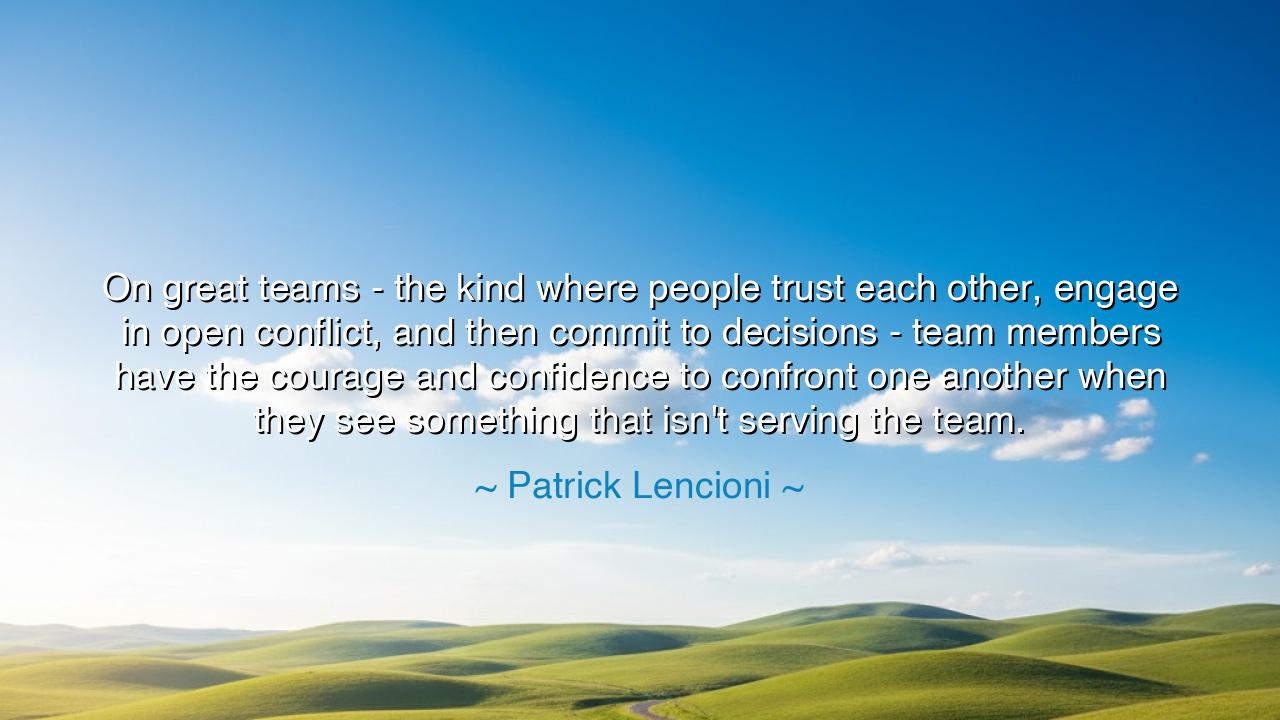
On great teams - the kind where people trust each other, engage
On great teams - the kind where people trust each other, engage in open conflict, and then commit to decisions - team members have the courage and confidence to confront one another when they see something that isn't serving the team.






When Patrick Lencioni wrote, “On great teams—the kind where people trust each other, engage in open conflict, and then commit to decisions—team members have the courage and confidence to confront one another when they see something that isn’t serving the team,” he spoke as a master of human cooperation, a sage of the modern age. His words reveal the secret anatomy of true teamwork, that most delicate and powerful of human endeavors. For no empire, no invention, no enduring work of greatness has ever been born of one person alone. Behind every triumph stands a circle of souls bound by trust, honesty, and the courage to speak truth for the sake of the whole.
Lencioni, a renowned thinker on leadership and organizational health, drew his wisdom not from theory alone, but from observing the pulse of real teams—those that succeed and those that crumble. His teaching reminds us that the foundation of all great collaboration is trust. Without trust, words are guarded, intentions are doubted, and fear poisons every exchange. But where trust lives, people are unafraid to speak their minds, to challenge ideas, and to offer correction. It is not silence that makes a team strong—it is truth, spoken with respect and courage.
The ancients, too, knew this truth. In the chronicles of Sparta, it was said that the strength of their warriors lay not in their spears or shields, but in their unity. Each man’s shield protected the one beside him, and thus their formation was unbreakable. Yet such unity was not born of blind obedience; it came from discipline, from trust, and from the freedom to hold one another accountable. The Spartan soldier could rebuke his comrade, not out of pride, but out of love for the phalanx. So too must every modern team—whether in battle, in business, or in art—learn the same courage of confrontation.
To confront is not to quarrel. It is to care enough to speak when silence would be easier. The weak avoid conflict, seeking peace without truth; the strong embrace conflict, seeking truth that leads to peace. Lencioni’s insight pierces to the heart of this paradox: great teams are not without disagreement, but rather, they wield disagreement as a forge for excellence. When people trust each other, even heated debate becomes sacred, for all know that its purpose is not personal victory but collective growth. Out of honest conflict comes clarity; out of clarity, commitment; and out of commitment, results that endure.
History gives us countless lessons in this. Consider the story of Abraham Lincoln and his “team of rivals.” When he became President of the United States, Lincoln surrounded himself not with flatterers, but with men who often opposed him—brilliant minds who argued, criticized, and challenged his decisions. Yet because Lincoln built trust among them, their fierce debates yielded wisdom, not division. His leadership embodied what Lencioni described centuries later: that true greatness is born when people have the confidence to speak and the humility to listen. In that crucible of candor, a fractured nation found its unity again.
In the modern world, where pride and fear still divide, Lencioni’s words are a call to courage. For every team—whether of family, of colleagues, or of friends—must face moments when truth must be spoken, even if it stings. The courage to confront a friend drifting from the path, a colleague failing the mission, or a leader losing sight of the goal—this courage defines the difference between mediocrity and greatness. Such courage is not cruelty; it is compassion in its highest form. The one who dares to correct does so not for dominance, but for love—for the preservation of the bond and the pursuit of the shared purpose.
So, my children of cooperation and purpose, take this wisdom to heart: if you would build something enduring, build it upon trust. Speak truth without fear; receive correction without pride. When conflict comes, face it as a craftsman faces his forge—knowing that the fire refines, not destroys. For in the sacred circle of a true team, there is no “I” and “you,” but only we, bound by duty and courage. As Patrick Lencioni taught, the greatness of a team is not found in the absence of conflict, but in the honor of truth, the courage of accountability, and the unity of purpose. Let every company, every family, every circle of hearts remember this: that to speak truth for the good of all is the highest act of loyalty—and the surest path to greatness.






AAdministratorAdministrator
Welcome, honored guests. Please leave a comment, we will respond soon